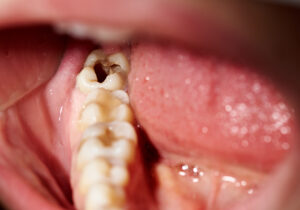What Causes a Toothache?
A toothache can be very painful, and to make things worse it is not always easy to identify the reason for what causes a toothache. I have compiled a list of 9 reasons for what causes a toothache, for you to identify your possible dental problem.
A toothache normally signals a deeper issue. Sometimes it can show you that you need to get a dental health check-up. A toothache is generally not something to be ignored.
So, if you notice your tooth is hurting, seek professional help. However, in some instances, it could be because of dental work. Don’t be alarmed if you get dental work and you have some discomfort for a few days. However, if it becomes excruciating seek professional help.

1. Tooth Decay
The one main cause of tooth pain is decay. The teeth are made up mostly of a hard mineral called enamel. Below this lies the dentin, followed by a shaded region known as the pulp. The pulp contains nerves and blood vessels that connect up to the brain.
Tooth decay occurs when bacteria digest the food particles that are trapped between your teeth, forming acids. These proteins dissolve the enamel and eventually reach the dentin. Once they reach this level, the tooth becomes excruciatingly sensitive to temperature changes or even air pressure. The bacteria involved in decay can also spread throughout the body through one’s bloodstream if it is not removed from the roots of the teeth.
The cause: bacteria and food particles become trapped in between teeth and decay forms after they dissolve enamel. Tooth decay can be prevented by removing these particles from between your teeth daily and taking care of them at the dentist’s office.

2. Bruxism
Have you ever heard of people grinding their teeth? This condition is called bruxism and typically affects young adults who grind their teeth at night while they sleep. It’s not typically painful, but the constant grinding can wear down your teeth over time. If you find that your teeth hurt when you wake up, then this might be your problem.
The cause: bruxism is the act of clenching or grinding one’s teeth. This can lead to pain as well as tooth loss if it is not treated immediately via a mouthguard.
3. TMJ Disorder
Temporomandibular joint disorder (TMJ) is a painful condition that causes your jaw to hurt and become stiff. You might even find it difficult to open your mouth. The exact reason why TMJ occurs isn’t well understood, but there are various theories about what causes the pain. The most common one is muscle spasms, which are caused by stress or clenching of your jaw for long periods.
The cause: Tulsa dentists aren’t sure what the actual reason is for TMJ, but they know that certain factors can trigger it. This can include anything from stress to clenching one’s jaws, which can lead to clenching one’s teeth.

4. Dental Cyst
A cyst is a fluid-filled sac under the gums, and may also cause pain when chewing or drinking very hot or cold things. Your dentist will drain this area to provide relief from the pain.
The cause: dental cysts can be caused for a myriad of reasons. Some of the causes include poor gum hygiene, teeth coming in incorrectly, or biting excessively. Dental cysts can be clear or full of infection.
5. Infection in the Mouth or Jaw
The dentist will first try to treat the infection by prescribing an antibiotic. This should provide some immediate pain relief. However, if the reason for your toothache is not adequately treated, you may suffer from chronic pain.
The cause: infection can be for many reasons, including other underlying health conditions such as heart issues. It is important to determine the exact cause of the infection. This can be done by taking x-rays of your jaw and teeth. An abscess is a complication of advanced tooth decay. When the dentist treats it, he may use antibiotics and painkillers.
6. Impacted Teeth
Impacted teeth are those that have not come into contact with other normal teeth in your mouth, but remain trapped underneath them. Your dentist must remove this excess tooth tissue to prevent a toothache from occurring.
The cause: teeth crowding in your mouth. Many times this is due to genetics. If your teeth are crowded, it can cause the other teeth to not be able to come in fully.
7. Teeth Moved by Orthodontics
If you wear braces, the teeth can become malpositioned over time. This causes pain when you eat hot or cold things. This problem can be resolved by visiting the dentist for a checkup.
The cause: when you get your braces put on or adjusted it causes tension. The tension is due to braces pulling on the teeth to get them to come in line. Anytime they get adjusted it is putting more pressure and tension on your teeth. This is very normal and shouldn’t be cause for concern.

How to Treat Your Toothache at Home
First, rinse your mouth out with warm saltwater. Just put some salt in your palm and rinse vigorously for about one minute, then spit the water out. This will clean the inside of your mouth and help you feel better. If this doesn’t work, try gargling some warm saltwater.
Next, you should try to take something for the pain, like ibuprofen (Advil) or acetaminophen (Tylenol). If you can’t access any of those and don’t have any aspirin at home, then use a teaspoon that has been microwaved until it is very hot.
Put the teaspoon on top of your tooth and hold it there for about two minutes, then take it away. This will help with the pain as well as provide some temporary relief. You can wrap a towel around the teaspoon to make it easier to hold onto if you have trouble holding onto something so small.
In addition, you should chew on the cut side of a clove of garlic. Garlic is one of nature’s best antibiotics.
Chewing on it and letting it sit in your mouth for about ten minutes should help to ease your pain and kill any bacteria that may be present. You can also try putting parsley directly onto the tooth. This will also help with any pain you are feeling.
If these methods do not work, then it may be time to go to the hospital or another treatment center to see what they can do for you. This is especially true if you cannot take ibuprofen at all because of allergies, if your toothache is interfering with eating or sleeping, or if the pain is so bad that you cannot concentrate.
When to Seek Professional Help.
A toothache is a type of pain in the teeth. Toothaches can be very painful and are common in both children and adults. They usually occur because one of your teeth decayed or an abscess formed on it, but they can also come from problems such as sinusitis or even gum disease.
While you may think the source of your pain is obvious, your dentist will use a litany of tests to determine what’s causing it. In this article, we’ll look at the causes and treatments for toothaches.
If your pain is more severe and doesn’t go away after using these remedies for a day or two, try calling your dentist. If you live in an area where dental emergencies are rare, call your dentist first.
However, if they don’t answer or it’s after hours, go to the nearest hospital’s emergency room. There, a doctor will be able to tell you exactly what’s causing the pain and recommend treatment that may include antibiotics (to kill the bacteria causing the infection) or extraction of the tooth if it’s severely damaged.

